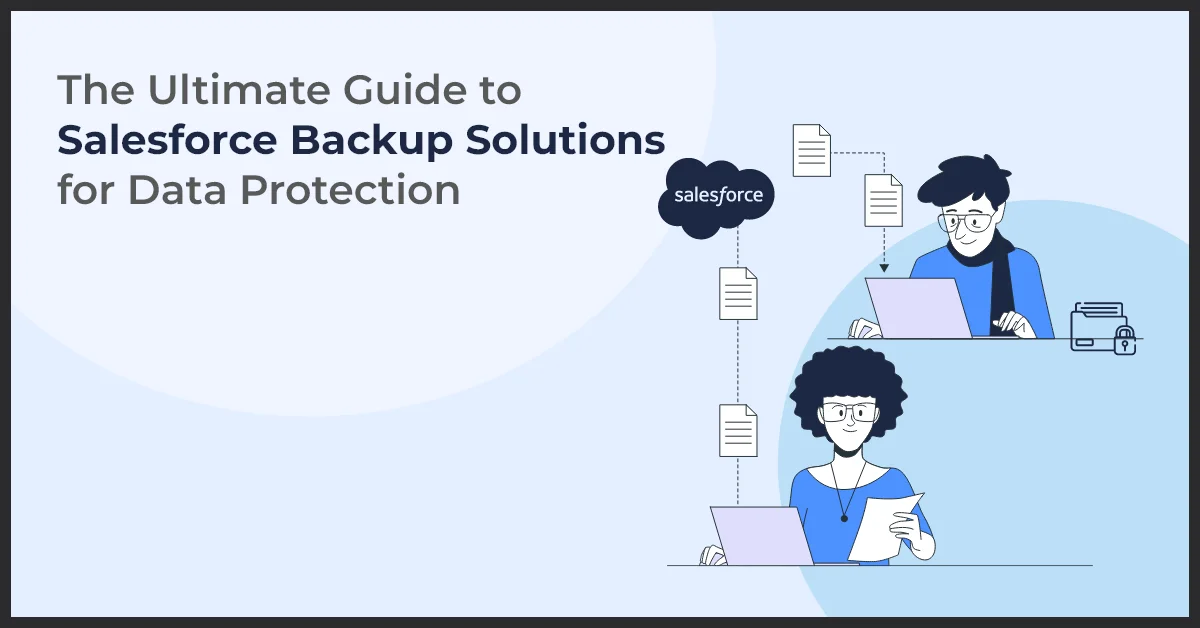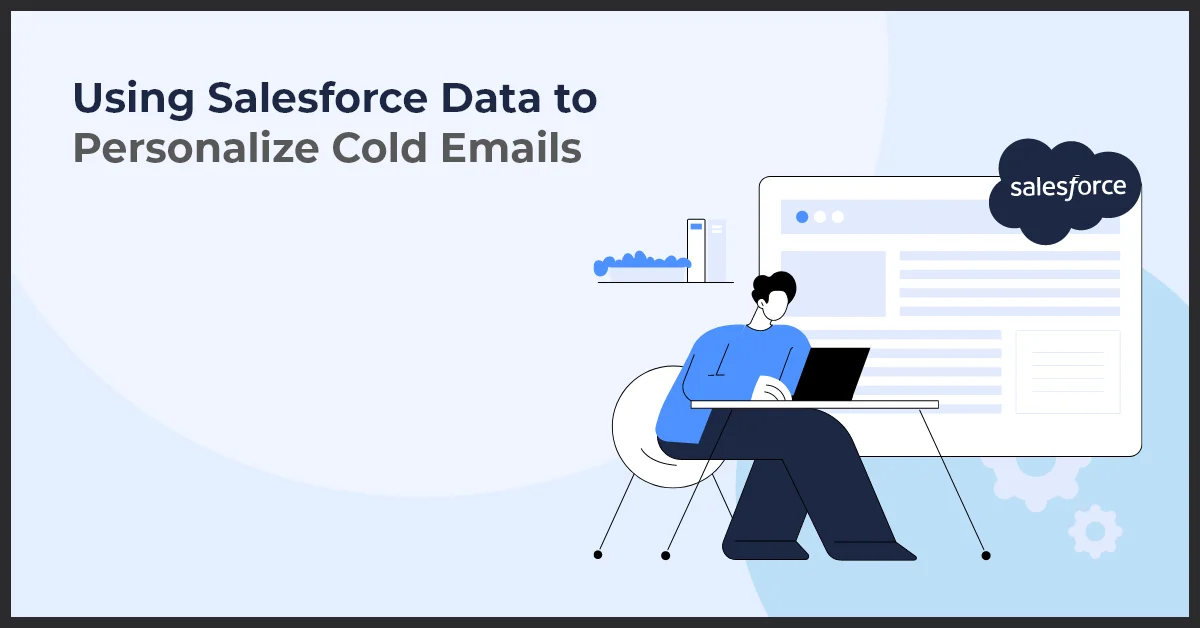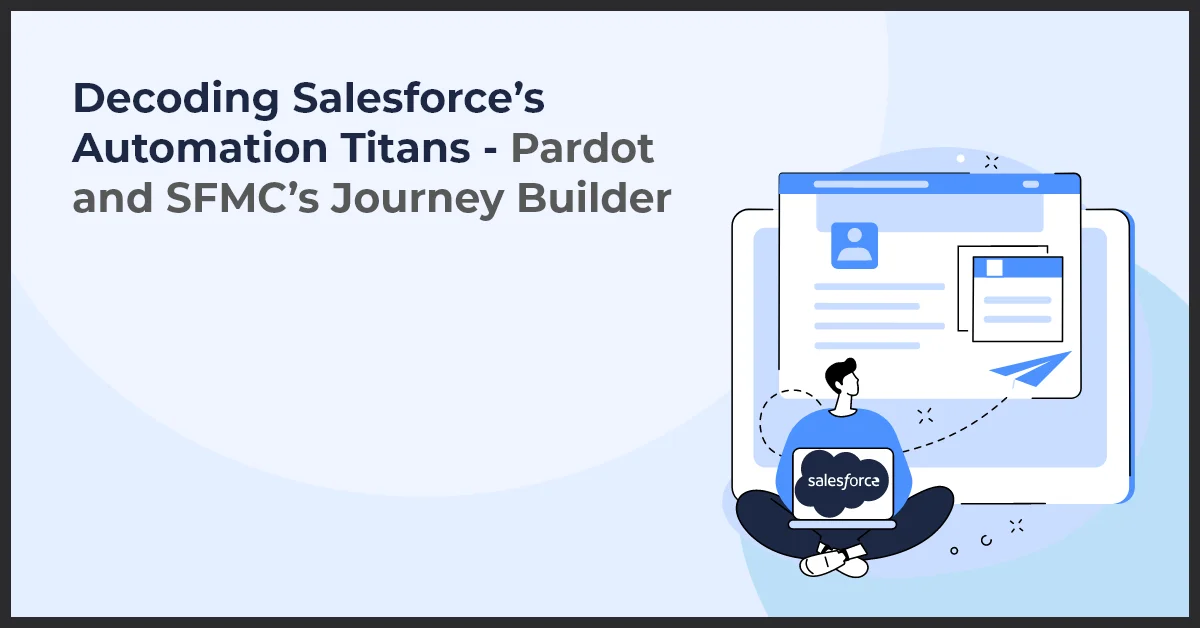The Ultimate Guide to Salesforce Backup Solutions for Data Protection

Published on: November 16, 2023
Updated on: June 11, 2024
854 Views
- Salesforce
9 min read
Welcome to our comprehensive guide on Salesforce backup solutions! In today's digital age, data backup and protection have become vital for businesses, and Salesforce users are no exception. With valuable customer information, sales data, and critical business processes stored within Salesforce, having a reliable backup solution is crucial to safeguarding your data from unpredictable disasters.
Not having a dependable backup solution can result in severe consequences for your business. Imagine losing important customer records, sales contracts, or valuable insights gathered over time. Apart from the immediate impact on your daily operations, the loss of crucial data can damage customer trust, hinder decision-making, and ultimately lead to financial losses.
That's where reliable Salesforce backup solutions come into play. By implementing a robust backup strategy, you can ensure the safety and integrity of your Salesforce data, protecting it from accidental deletions, system failures, cyber threats, and even human errors. This guide will walk you through the key considerations, best practices, and top solutions to help you choose the right Salesforce backup system for your business.
Understanding Salesforce Backup
A. Salesforce
Salesforce is a leading cloud-based CRM platform that revolutionizes the way businesses manage customer relationships and streamline operations. With its comprehensive suite of tools and features, Salesforce enables organizations to enhance customer experiences, drive sales, and boost productivity.
As an essential component of any business strategy, Salesforce offers a centralized platform where companies can store and manage vast amounts of valuable customer data. From contact details and purchase history to communication logs and marketing campaigns, Salesforce serves as the backbone for maintaining vital customer information.
B. Data Backup
Data backup refers to the process of creating duplicate copies of critical data to ensure its availability and integrity. In the era of digital transformation, where data is the lifeblood of organizations, having a robust backup strategy is vital to prevent data loss, minimize downtime, and maintain business continuity.
Specifically tailored for Salesforce, backup solutions play a crucial role in meeting the unique backup and recovery requirements of this cloud-based CRM platform. These solutions offer automated backups, intelligent data duplication, and efficient data recovery mechanisms, providing organizations with peace of mind and confidence in their data's safety.
C. Metadata Backup
In the realm of Salesforce, metadata refers to the structure and configuration of the platform, including custom objects, fields, workflows, and security settings. It defines how data is organized and stored within Salesforce, shaping the overall functionality and user experience. Thus, backing up metadata is just as crucial as backing up data itself.
A complete backup strategy must encompass both data and metadata. Neglecting metadata backup can result in the loss of crucial customization settings, leading to data inconsistencies and operational disruptions. To ensure a comprehensive recovery process, organizations must prioritize the backup of both data and metadata in their Salesforce environment.
Salesforce Backup Solutions Overview
A. Salesforce Backup Tools
When it comes to Salesforce backup, having the right tools is crucial. There are various tools available in the market specifically designed to handle Salesforce backup. These tools come with a range of features and functionalities, ensuring seamless backup and restore processes.
It is important to explore different Salesforce backup tools and understand their compatibility with different Salesforce editions. By doing so, you can select the tool that best suits your organization's needs and requirements.
B. Cloud-based Salesforce Backup Solutions
One of the advantages of using cloud-based backup solutions for Salesforce data is the scalability it offers. These solutions provide the flexibility to adapt to your organization's growing data storage needs without any hassle.
Cloud-based Salesforce backup solutions are also known for their ease of implementation. They can be quickly set up and integrated with your existing Salesforce environment, minimizing any disruption to your workflow.
Furthermore, these solutions are cost-effective as they eliminate the need for on-premises infrastructure and maintenance. Cloud-based backup solutions offer a subscription-based pricing model, ensuring affordability for businesses of all sizes.
C. Salesforce Backup Strategies
Having a reliable backup strategy is essential to protect your Salesforce data. Understanding different backup strategies and their applicability to Salesforce can help you make informed decisions for your organization.
Incremental backups, full backups, and scheduled backups are some of the viable options for Salesforce backup. Incremental backups only store changes made since the last backup, saving storage space and reducing backup time. Full backups, on the other hand, capture all data at a specific point in time, ensuring a complete copy of your Salesforce data. Scheduled backups allow you to automate the backup process, ensuring regular and consistent data protection.
By leveraging the right backup strategy, you can safeguard your Salesforce data and minimize the risk of data loss.
Best Practices for Salesforce Backup
When it comes to Salesforce backup, following industry best practices is key to ensuring the safety and security of your data. Implementing the following guidelines will help you protect your valuable Salesforce information:
A. Salesforce Data Protection
1. Secure Your Salesforce Data
Protecting your Salesforce data against unauthorized access or loss is crucial. Implement strong access controls, such as multi-factor authentication, to ensure only authorized individuals can access your Salesforce instance.
2. Employ Encryption and Regularly Test Backups
Encrypting your backups helps prevent sensitive data from falling into the wrong hands. Regularly testing your backups ensures their integrity and recoverability, giving you confidence in the event of a data loss incident.
B. Salesforce Data Retention
1. Define Retention Policies
It is essential to establish retention policies for your Salesforce data. Clearly define how long different types of data should be retained based on legal and regulatory requirements, as well as your organization's specific needs.
2. Follow Industry Standards and Recommended Guidelines
Be aware of industry standards and recommended guidelines for data retention in Salesforce. Staying up-to-date with these standards ensures compliance and helps prevent data loss or legal complications.
C. Salesforce Sandbox Backup
1. Back Up Salesforce Sandboxes
Don't overlook the importance of backing up Salesforce sandboxes. Sandboxes are crucial for development and testing purposes, and losing sandbox data can significantly impact your workflows and processes.
2. Include Sandbox Backups in Overall Data Protection Strategies
Make sure to include sandbox backups in your overall data protection strategies. Treating sandbox data with the same level of care as production data helps maintain data consistency and provides a safety net for any potential issues.
Selecting the Right Salesforce Backup Solution
When it comes to choosing the right Salesforce backup solution, there are several factors to consider. Here, we will provide you with a checklist of essential features and functionalities, as well as discuss the importance of scalability, ease of use, and compatibility with existing Salesforce configurations.
Evaluating Backup Tools
Before making a decision, it's crucial to assess the features and functionalities offered by potential backup tools. Here's a checklist to help you with your evaluation:
- Data Recovery: Ensure that the backup solution offers a reliable and efficient data recovery process.
- Automated Backups: Look for a tool that can automatically schedule and perform regular backups.
- Incremental Backups: Consider a solution that offers incremental backups for faster and more efficient data protection.
- Point-in-Time Restore: Check if the tool provides the ability to restore data to a specific point in time.
- Integration: Verify if the backup solution seamlessly integrates with your existing Salesforce configurations.
Additionally, scalability and ease of use are crucial factors to consider. Make sure that the backup tool can handle your growing data volume and is user-friendly for your team.
Assessing Cloud-based Solutions
When evaluating different cloud-based Salesforce backup solutions, there are key factors you should take into account:
- Security Measures: Ensure that the solution provides robust security measures to protect your sensitive Salesforce data.
- Data Sovereignty: Consider where your data will be stored and if the backup solution complies with relevant data protection regulations.
- Vendor Reputation: Research the reputation and track record of the backup solution provider to ensure reliability and trustworthiness.
- Customer Support: Evaluate the level of customer support offered by the vendor to ensure prompt assistance in case of any issues or questions.
Managing Data and Security Model
A robust backup solution plays a crucial role in managing complex Salesforce data and security models. It's important to:
- Ensure Data Consistency: Choose a backup solution that can maintain data consistency across different Salesforce objects and relationships.
- Maintain Security Controls: Look for a tool that allows you to retain security controls during the backup and recovery processes, ensuring your data remains protected.
By carefully evaluating backup tools, considering cloud-based solutions, and managing your data and security model, you can make an informed decision when selecting the right Salesforce backup solution for your business.
Conclusion
Key Takeaways: Salesforce Backup Solutions
- Understanding the importance of Salesforce backup is essential for any organization.
- There are various Salesforce backup solutions available in the market to cater to different business needs.
- Best practices for Salesforce backup include regular and automated backups, ensuring data integrity, and testing backup and restore processes.
- When selecting the right Salesforce backup solution, consider factors such as data security, scalability, ease of use, and cost.
Implementing a reliable backup solution is of utmost importance to safeguard Salesforce data and protect business continuity. Without a backup solution in place, organizations are at risk of losing critical data due to system failures, human errors, or malicious activities. A robust backup solution ensures that data can be recovered quickly and efficiently, minimizing downtime and enabling business operations to resume smoothly.
Protecting your Salesforce data is not just about complying with regulations and maintaining customer trust; it is a fundamental aspect of maintaining the efficiency and stability of your business. Don't overlook the importance of investing in a reliable Salesforce backup solution. Take proactive measures today to safeguard your Salesforce data and ensure uninterrupted business continuity.
Frequently Asked Questions
Backing up Salesforce data is essential for protecting against data loss due to accidental deletions, data corruption, malicious attacks, or system failures. Regular backups ensure business continuity and quick recovery from data loss incidents.
You should back up all types of data in Salesforce, including standard and custom objects, attachments, files, documents, metadata (like custom fields and page layouts), and configuration settings. Comprehensive backups ensure that all critical aspects of your Salesforce environment are protected.
Without a backup solution, businesses risk permanent data loss, which can lead to significant operational disruptions, financial loss, damage to reputation, and potential non-compliance with data protection regulations.
Salesforce backup solutions typically use Salesforce APIs to extract data and metadata from your Salesforce instance. This data is then securely stored in an external location, such as cloud storage or on-premises servers. Many solutions offer automated backups, encryption, and granular restore options.
Salesforce offers native tools like Data Export Service and Weekly Export. Third-party solutions provide additional features like automated daily backups, point-in-time recovery, and more robust data security and compliance options.



